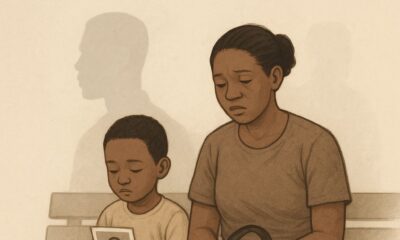Features
Temi Olajide: How to Help Your Children Through Difficult Situations
Often times, children (especially the younger ones) may not have the ability to verbalize their feelings. As a parent, it is your duty to observe them carefully for any signs of stress. Stress symptoms may be long or short – it all depends on the severity of the situation.
 As a parent, you would have gone through one difficult situation or the other – but when it comes to your kids, you sometimes might not have an idea on how to help them cope with difficult circumstances.
As a parent, you would have gone through one difficult situation or the other – but when it comes to your kids, you sometimes might not have an idea on how to help them cope with difficult circumstances.
Life will always have its ups and downs and the earlier kids know how to cope in these kinds of situations, the better for them. The first thing to do when something negative happens is to answer their questions – this helps them understand what’s happening and teach them how to cope in the future.
Often times, children (especially the younger ones) may not have the ability to verbalize their feelings. As a parent, it is your duty to observe them carefully for any signs of stress. Stress symptoms may be long or short – it all depends on the severity of the situation.
Stress symptoms may include one or a combination of the following:
- There may be changes in eating, sleeping, or bathroom habits
- Children may experience increased separation anxiety
- They may experience bad dreams
- Crying spells
- Kids may become withdrawn
- Increased aggressive behavior or unnecessary tantrums
How can you help your children cope with stress? Here’s what you can do:
- Encourage kids to express their feelings. Allow them to express whatever it is they’re experiencing and let them know it is okay to feel the way they do.
- Ensure that they follow routines as much as possible. In addition, ensure they eat healthy meals and rest adequately.
- For older kids, allow them read books that’ll teach them about characters in stressful situations – they will learn how to cope.
- Encourage your kids to exercise. Simple exercises such as dancing, walking and swimming can help reduce the effect of stress.
If a child isn’t adjusted properly and is still showing signs of stress after a long period of time, it is in the best interest of the child that you seek professional advice immediately.
Helping Children Deal with Traumatic Events
In traumatic situations, children often react in different ways, depending on their personality. While some continue as though nothing happened, some may experience sadness or worse still, depression. If your child is experiencing difficulty, it is important that they are provided with the love and stability to help them process and overcome the situation.
Here are some guidelines to help you:
Answer children’s questions
The aftermath of an accident or dramatic incident may leave children with a lot of questions. Just like us, kids also need their feelings acknowledged, as well as an opportunity to talk about their feelings. Also, ensure that your explanation of the event matches the child’s developmental understanding.
Reassure them as much as you can
Physical contact such as holding and hugging not only reassures your little one, it’s also a great way to help your child feel safe. In addition, you can help the child feel better about the situation and provide comfort without giving wrong information or false hopes. For example, saying “I am sure everything is going to be fine” will help to put your child’s mind to rest.
Remain observant
Ensure that you keep a watchful eye on your child even as their thoughts and feelings about the situation evolves. Listen to them, ask questions and continue to reassure them as much as you can. Most importantly, give them the opportunity to express themselves.
Remember that life comes with its challenges and it’s your duty as a parent to teach and show your child(ren) how to go through life by handling these difficult situations positively.



















